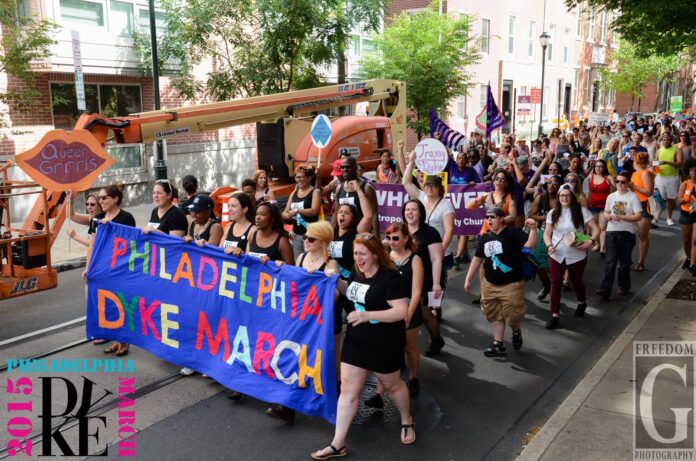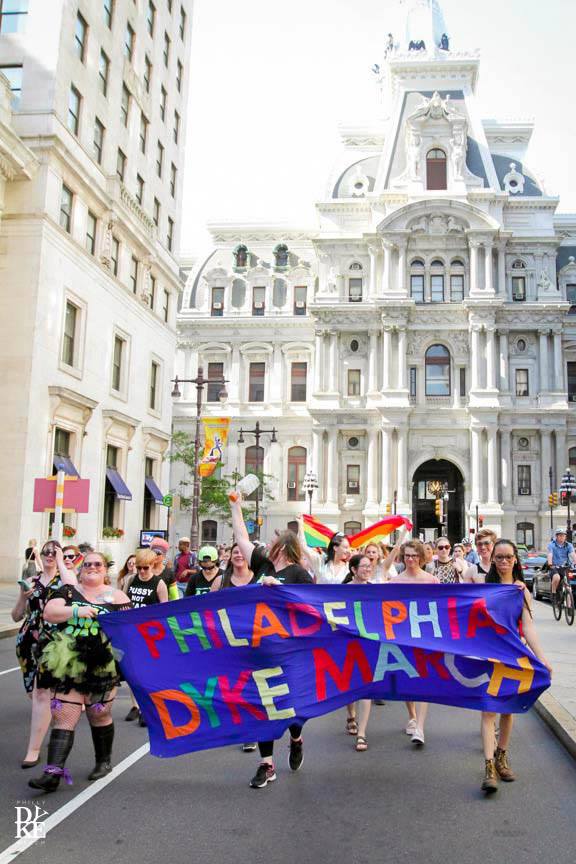
“I was living in DC and came out to my family in 2016 — so when I moved to Philly, I was really intentional about trying to find community with other queer women,” said Rachele Fortier, a bisexual woman who has been involved with Philly Dyke March since 2018.
This year, Philly Dyke March will once again host its own protest rally on Saturday, June 1. The event, which has been put on pause for several years, will begin in Kahn Park at 11 a.m., and attendees will take to the streets in a non-permitted march at noon.
Dyke Marches emerged in the ’90s as a reaction to corporate-sponsored Pride events, which have historically tended to center the experiences of white, cis gay men. These marches created space for those who haven’t felt like they fit into other Pride celebrations. They’re often held on the eve of local Pride festivities and tend to be protests rather than parades.
“I find it very uplifting and powerful to come together in community and take to the street and be loud and be visible in public and feel safe together,” said Fortier. “This is a space for us, by us — to be visible and proud of who we are and when to let people know that in a really public way.”
“It’s about making and taking space for our community,” she added. “This is a space for members of our community who maybe don’t feel welcome even in other queer spaces to come and be in community and to let people know that we are here and that we exist.”
Philadelphia’s Dyke March started in 1998 and quickly became a staple kick-off for Pride month for over 20 years before the group shifted its approach more recently.
Philly Dyke March last hosted its annual pre-Pride march in 2019. In 2020, they instead collaborated with Philly Queer March for Black Lives. The following year, the group opted not to participate in or host Pride events due to concerns around COVID. In 2022, Philly Dyke March joined PHL Pride Collective to reimagine what Pride could become after the dissolution of Philly Pride Presents. Last year, the group stood as a human blockade between anti-Pride protesters and participants during the Pride March, which took place before the city’s festival.
“I feel like there’s a lot of enthusiasm,” said Fortier about former organizers and new volunteers coming together to bring the event to life again.
Fortier explained that even though Philadelphia’s Pride festivities are becoming more community-led and have focused on more diverse queer communities, she’s still concerned about the lack of space for queer women in the city.
“So we feel all the more motivated to hold on to this and to create space for ourselves and other people like us,” added Sam Lilley, a trans lesbian, about the need to preserve the Dyke March. “I feel really great to be a part of that — to expand my community and offer everyone a place.”
Organizers say the event is for anyone who personally identifies as a dyke within a broad definition that allows people to feel out their own connection to the word. Allies who hope to center and uplift the needs and experiences of dykes are also welcome.
“We don’t want anybody to ever feel like they’re not dyke — or queer — enough. This is a very inclusive movement,” said Lilley. “Everybody needs to find their community, and we hope we can be part of the vessel for that — for people to grow and experience the beautiful queer community that you always knew you would be a part of. I think that’s one of my core beliefs in putting this together.”
“This is a place where people can come as they are,” added Fortier, underlining that although the march is a protest, it’s also a place to experience and focus on the radical joy of being in queer community.
“We are also being very thoughtful about how we can be accessible to everyone,” Fortier explained.
The group asks those who have accessibility concerns to fill out a form so organizers can better support those needs. They’re collaborating with TechOWL to provide mobility aids, will be distributing COVID test kits and masks to those who want to use them, and have partnered with WOAR, who will table at the event, to both help create a safe space and serve as a resource to Dyke March attendees.
“To anybody that would be anxious about coming not knowing what to expect, I just want the community to know that we’re here for you,” added Lilley.
Philly Dyke March has typically hosted the Mr. Philadelphia drag king competition, which served as both a way to connect in community and to raise funds for the organization. The event paused alongside the march after 2019 but organizers hope to bring it back soon. Those interested can watch social media chatter to see what develops for 2024. In the future, the group hopes to have more of a year-round presence as well. To make that happen, they’re seeking new volunteers.
The group’s current organizers are prioritizing the safety, inclusivity, and affirmation of participants and recognize that more marginalized and vulnerable people will need more protections and support for the group and its events to truly be accessible. They’re re-launching with new structure and support systems — eliminating hierarchical leadership roles.
“We’re a very democratic organization,” Fortier said. “All of our decisions are made as a collective to make sure that everyone’s voices are heard.”
“We’re looking for diversity, across race, age, gender, lifestyle, all of that. Dyke March has always been very inclusive and had a diverse group of organizers,” Fortier added. “And we want to keep that moving forward — so anyone who identifies as part of our community or as an ally or an accomplice and wants to dedicate their time, we welcome [you].”
Fortier encouraged those interested to check out the group’s weekly Zoom meetings, which she said are open to the public, emphasizing that people can participate in various capacities and offer as much time and energy as they feel capable of offering. Those interested can sign up on the Philly Dyke March mailing list via the organization’s website.
Lilley, who will be participating in the march for the first time this year, got involved with the group last year after hearing about the Dyke March from her girlfriend, who had marched in years past. Lilley tabled on behalf of the group at Pride 2023, selling T-shirts and familiarizing attendees with the march.

“I really wanted to participate and really be in the community that I had always wanted to be in — that I knew I belonged in before I even came out and was out myself and all that,” she said. “So it’s been a very validating experience for me.”
Lilley hopes that during a time when spaces for queer women are dwindling all across the country, Dyke Marches will continue to bring them together — and remind others to pay attention to queer women.
“Y’all better notice us,” she underlined. “We’re here and we’re not going away.”
The Philly Dyke March will take place at 11 a.m. on June 1 at Kahn Park, 11th St. and Pine St. For more information, visit phillydykemarch.com.